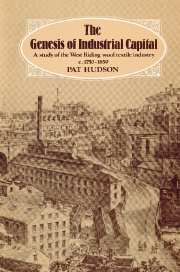Book contents
- Frontmatter
- Contents
- List of plates
- List of diagrams, graphs and maps
- List of tables
- Foreword by François Crouzet
- Preface
- Acknowledgements
- Part 1 INTRODUCTION
- Part 2 THE PRIMARY ACCUMULATION OF CAPITAL
- Part 3 THE WEB OF CREDIT
- Part 4 EXTERNAL AND INTERNAL FINANCE
- Part 5 SUMMARY AND CONCLUSION
- APPENDIX: TABLES RELATING TO CHAPTER 10
- Notes
- Bibliography
- Name and place index
- Subject index
Preface
Published online by Cambridge University Press: 09 November 2009
- Frontmatter
- Contents
- List of plates
- List of diagrams, graphs and maps
- List of tables
- Foreword by François Crouzet
- Preface
- Acknowledgements
- Part 1 INTRODUCTION
- Part 2 THE PRIMARY ACCUMULATION OF CAPITAL
- Part 3 THE WEB OF CREDIT
- Part 4 EXTERNAL AND INTERNAL FINANCE
- Part 5 SUMMARY AND CONCLUSION
- APPENDIX: TABLES RELATING TO CHAPTER 10
- Notes
- Bibliography
- Name and place index
- Subject index
Summary
Since the rapid expansion of social science in the 1960s, interest in some of the traditional questions concerning economic historians has waned. ‘Good Old Economic History’ gave way to the simultaneous claims of econometric history on the one hand and the new social history on the other. Valuable though these developments may have been, particularly the latter, it has meant that economic history, beyond quantitative and neo-classical analyses, has languished. The edifice of valuable empirical building blocks emerging from social and cultural history has not been matched by economic history studies. We have progressed some way in establishing the advantages and limitations of various theoretical constructs but, particularly in the field of industrial history, we have little more data to fill these theoretical boxes than we had in Clapham's day. Since the classic works of Heaton, Wadsworth and Mann, Court, Clapham himself and the generation from the 1930s to 1950s (who were my staple diet as an undergraduate), the numbers of sectoral or regional studies of British industry have been few. The time is ripe for rehabilitation and renewal of this empirical tradition.
New studies will not, however, mark significant progress in the discipline if they replicate the traditional empirical approach ignoring the ways in which new interdisciplinary orientations have entered our perception of traditional questions. Economic history is nothing if it neglects the institutional, social and cultural dimensions of change. The economy is an embedded process impossible to extract from the plethora of ‘non-economic’ relationships, ideals, tradition, customs, beliefs and emotions.
- Type
- Chapter
- Information
- The Genesis of Industrial CapitalA Study of West Riding Wool Textile Industry, c.1750-1850, pp. xvii - xviiiPublisher: Cambridge University PressPrint publication year: 1986

